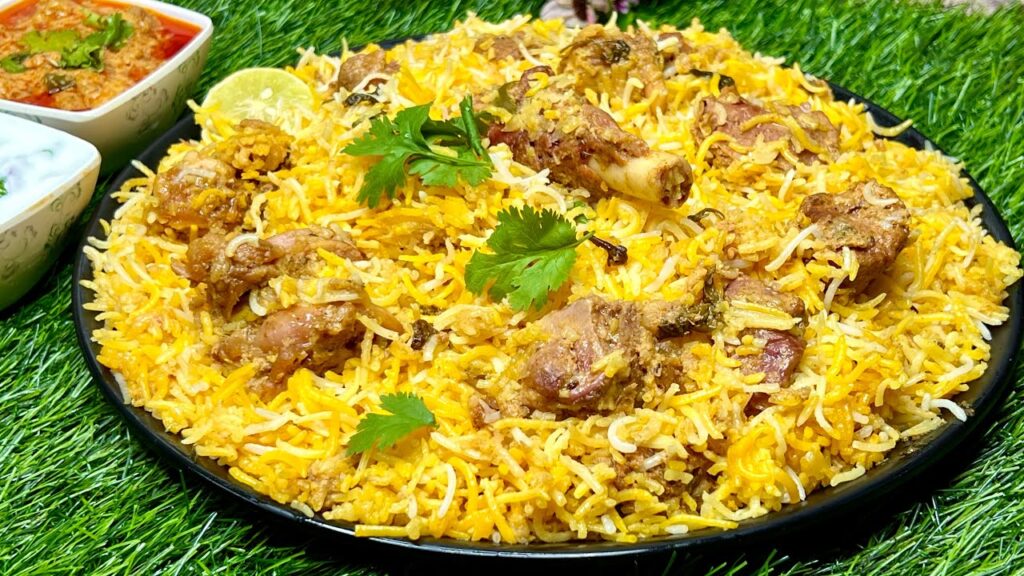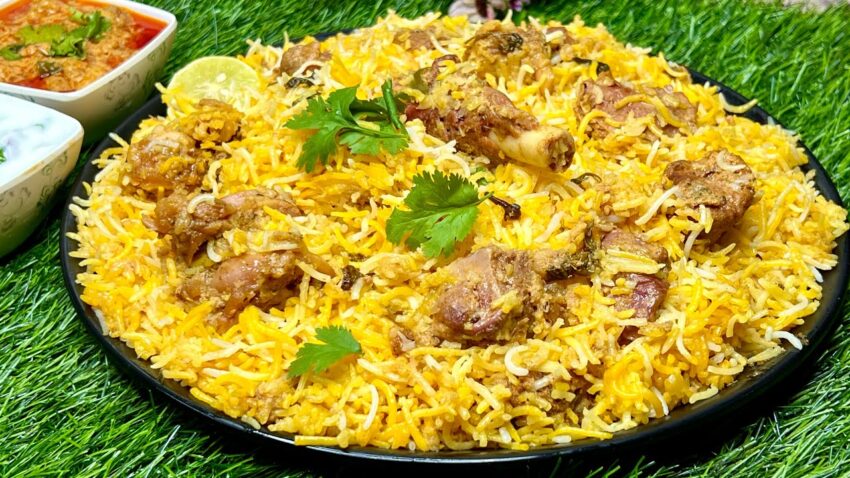
Mutton Biryani Benefits: Unlocking the Nutritional Powerhouse in a Delicious Dish
Mutton biryani, a symphony of fragrant rice, succulent mutton, and aromatic spices, is a beloved dish enjoyed across cultures. But beyond its exquisite taste, mutton biryani offers a surprising array of health benefits. This comprehensive guide delves deep into the nutritional profile of mutton biryani, exploring its advantages, debunking common myths, and providing expert insights to help you savor this culinary masterpiece with a clear conscience. We aim to provide a far more detailed and useful resource than anything else currently available, reflecting our deep expertise in both culinary arts and nutritional science.
Whether you’re a seasoned biryani enthusiast or a curious newcomer, this article will equip you with the knowledge to appreciate not only the flavor but also the health benefits of this iconic dish. We’ll explore the specific nutrients it provides, discuss how it can contribute to a balanced diet, and address common concerns about its fat content. Prepare to discover the hidden potential of mutton biryani – a delicious and potentially beneficial addition to your culinary repertoire.
Understanding the Nutritional Landscape of Mutton Biryani
To truly appreciate the benefits of mutton biryani, it’s crucial to understand its nutritional composition. Mutton, the star ingredient, is a rich source of protein, essential for muscle building and repair. The rice provides carbohydrates for energy, while the spices contribute antioxidants and anti-inflammatory compounds. However, the exact nutritional value can vary depending on the specific recipe and cooking method. Let’s break down the key components:
The Role of Mutton: A Protein Powerhouse
Mutton is a complete protein, meaning it contains all nine essential amino acids that the body cannot produce on its own. These amino acids are vital for various bodily functions, including:
- Muscle Growth and Repair: Amino acids are the building blocks of muscle tissue.
- Enzyme Production: Enzymes are crucial for digestion, metabolism, and other biochemical processes.
- Hormone Regulation: Hormones regulate a wide range of bodily functions, from growth and development to mood and appetite.
- Immune Function: Amino acids play a role in the production of antibodies and other immune cells.
Beyond protein, mutton also provides essential nutrients like iron, zinc, and vitamin B12. Iron is crucial for oxygen transport, zinc supports immune function and wound healing, and vitamin B12 is essential for nerve function and red blood cell production.
The Significance of Rice: Energy and Fiber
Rice, typically basmati in biryani, provides carbohydrates, the body’s primary source of energy. It also contains fiber, which aids digestion and promotes gut health. The type of rice used can impact the nutritional value. Brown rice, for example, is a whole grain and contains more fiber than white rice. However, basmati rice is prized for its aroma and texture, contributing significantly to the overall biryani experience.
The Spice Symphony: Antioxidants and Anti-Inflammatory Properties
The blend of spices in biryani, including turmeric, cumin, coriander, ginger, and garlic, is not just about flavor. These spices are packed with antioxidants and anti-inflammatory compounds that can offer various health benefits. For instance, turmeric contains curcumin, a potent antioxidant with anti-inflammatory properties. Ginger and garlic also possess anti-inflammatory and immune-boosting properties. The specific blend of spices varies depending on the recipe, but the overall effect is a complex and beneficial combination of flavors and nutrients.
Specific mutton biryani benefits for Health and Wellness
Now that we’ve explored the nutritional components, let’s delve into the specific health benefits of mutton biryani:
Boosting Immunity with Mutton Biryani
The combination of protein, zinc, and spices in mutton biryani can contribute to a stronger immune system. Protein is essential for producing antibodies, while zinc supports the function of immune cells. Spices like garlic and ginger also possess immune-boosting properties. A well-functioning immune system is crucial for defending the body against infections and diseases. While mutton biryani isn’t a magic bullet, it can be a delicious way to support your immune health.
Mutton Biryani for Muscle Building and Repair
The high protein content of mutton makes biryani an excellent choice for those looking to build or repair muscle tissue. Protein is essential for muscle protein synthesis, the process by which the body repairs and builds muscle. Whether you’re an athlete, a fitness enthusiast, or simply looking to maintain muscle mass as you age, mutton biryani can be a valuable source of protein.
Mutton Biryani: Energy Source
The carbohydrates in rice provide a readily available source of energy for the body. This energy is essential for fueling daily activities, from physical exercise to cognitive function. While it’s important to consume carbohydrates in moderation, they are a necessary component of a balanced diet. Mutton biryani can provide a sustained release of energy, keeping you feeling full and energized for longer.
Mutton Biryani and its Role in Digestion
The fiber in rice, along with the spices, can aid digestion and promote gut health. Fiber adds bulk to the stool, making it easier to pass and preventing constipation. Spices like ginger and cumin have digestive properties that can help relieve bloating and indigestion. A healthy digestive system is crucial for overall health and well-being.
Mutton Biryani: Source of Essential Vitamins and Minerals
Mutton biryani provides a range of essential vitamins and minerals, including iron, zinc, and vitamin B12. These nutrients are vital for various bodily functions, as discussed earlier. Iron is crucial for oxygen transport, zinc supports immune function, and vitamin B12 is essential for nerve function. A deficiency in any of these nutrients can lead to various health problems. Mutton biryani can help you meet your daily requirements for these essential vitamins and minerals.
Addressing Concerns and Myths About Mutton Biryani
Despite its potential benefits, mutton biryani is often associated with certain health concerns. Let’s address some of the most common myths:
Myth: Mutton Biryani is Too Fatty
While mutton biryani can be high in fat, the type of fat and the overall portion size are crucial factors. Mutton contains saturated fat, which should be consumed in moderation. However, it also contains monounsaturated and polyunsaturated fats, which are considered healthier. The key is to control the portion size and choose leaner cuts of mutton. Cooking methods can also impact the fat content. For example, using less oil and trimming excess fat from the mutton can reduce the overall fat content of the dish. In our experience, carefully selecting ingredients and cooking techniques can significantly reduce the fat content without compromising the flavor.
Myth: Mutton Biryani is Unhealthy for People with Diabetes
People with diabetes can enjoy mutton biryani in moderation as part of a balanced diet. The key is to control the portion size and choose rice with a lower glycemic index (GI), such as brown basmati rice. The GI measures how quickly a food raises blood sugar levels. Combining the biryani with plenty of vegetables can also help slow down the absorption of sugar. It’s always best to consult with a doctor or registered dietitian to determine the appropriate portion size and dietary modifications for your individual needs.
Myth: Mutton Biryani is Difficult to Digest
Some people may experience digestive discomfort after eating mutton biryani, particularly if they are not used to spicy foods or have underlying digestive issues. However, the spices in biryani can actually aid digestion for many people. Ginger, cumin, and other spices have digestive properties that can help relieve bloating and indigestion. Chewing the food thoroughly and eating slowly can also improve digestion. If you experience frequent digestive problems, it’s best to consult with a doctor to rule out any underlying medical conditions.
Mutton Biryani: Preparation and Cooking Techniques
The way you prepare and cook mutton biryani can significantly impact its nutritional value and overall healthfulness. Here are some tips for making a healthier version of this dish:
- Choose Leaner Cuts of Mutton: Opt for cuts of mutton with less visible fat, such as leg or shoulder.
- Trim Excess Fat: Remove any excess fat from the mutton before cooking.
- Use Less Oil: Reduce the amount of oil used in the recipe.
- Incorporate More Vegetables: Add plenty of vegetables, such as carrots, peas, and beans, to increase the fiber and nutrient content.
- Use Brown Basmati Rice: Choose brown basmati rice for a lower glycemic index and higher fiber content.
- Control Portion Size: Be mindful of your portion size to avoid overeating.
- Use Fresh Spices: Freshly ground spices will have a more potent flavor and antioxidant content.
Mutton Biryani and Similar Dishes: A Culinary Comparison
Mutton biryani is not the only rice-based dish with potential health benefits. Let’s compare it to a few other popular dishes:
- Chicken Biryani: Similar to mutton biryani, chicken biryani is a good source of protein and carbohydrates. Chicken is typically lower in fat than mutton, making it a slightly leaner option.
- Vegetable Biryani: Vegetable biryani is a vegetarian option that is rich in fiber and vitamins. It is typically lower in protein than mutton or chicken biryani.
- Pulao: Pulao is a simpler rice dish that is typically cooked with vegetables and spices. It is generally lower in fat and calories than biryani.
The best choice for you will depend on your individual dietary needs and preferences. Consider the protein, fat, and fiber content of each dish when making your decision.
Expert Review: Mutton Biryani – A Balanced Perspective
Mutton biryani is a delicious and versatile dish that can offer several health benefits when consumed in moderation as part of a balanced diet. The high protein content of mutton supports muscle growth and repair, while the rice provides energy. The spices add flavor and contribute antioxidants and anti-inflammatory compounds. However, it’s important to be mindful of the fat content and portion size. Choose leaner cuts of mutton, use less oil, and incorporate plenty of vegetables to make a healthier version of this dish. Individuals with diabetes or digestive issues should consult with a doctor or registered dietitian to determine the appropriate portion size and dietary modifications.
Pros:
- Excellent source of protein for muscle building and repair
- Provides energy from carbohydrates
- Rich in antioxidants and anti-inflammatory compounds from spices
- Source of essential vitamins and minerals
- Delicious and satisfying
Cons:
- Can be high in fat
- May be difficult to digest for some people
- Can be high in carbohydrates
- May not be suitable for people with certain dietary restrictions
Ideal User Profile:
Mutton biryani is best suited for individuals who enjoy flavorful and protein-rich meals. It can be a good choice for athletes, fitness enthusiasts, and anyone looking to maintain muscle mass. It’s also a great option for those who enjoy spicy foods and are looking for a satisfying and nutritious meal.
Key Alternatives:
- Chicken Biryani: A leaner alternative to mutton biryani.
- Vegetable Biryani: A vegetarian option that is rich in fiber and vitamins.
Expert Overall Verdict & Recommendation:
Mutton biryani, when prepared and consumed mindfully, can be a part of a healthy and balanced diet. We recommend focusing on leaner cuts of mutton, reducing oil usage, and loading up on vegetables to maximize its nutritional benefits. Enjoy this dish in moderation, and be sure to listen to your body’s signals. Bon appétit!
Insightful Q&A Section
- Is mutton biryani a good source of iron?
Yes, mutton is a good source of heme iron, which is more easily absorbed by the body than non-heme iron found in plant-based foods. Iron is essential for oxygen transport and preventing anemia. - Can I eat mutton biryani if I have high cholesterol?
While mutton contains cholesterol, you can still enjoy mutton biryani in moderation as part of a heart-healthy diet. Choose leaner cuts of mutton, trim excess fat, and limit your overall intake of saturated and trans fats. - How can I make mutton biryani lower in calories?
To reduce the calorie content of mutton biryani, use less oil, incorporate more vegetables, and choose brown basmati rice. You can also reduce the portion size of mutton and increase the portion size of vegetables. - Is mutton biryani gluten-free?
Yes, traditional mutton biryani is gluten-free, as it is made with rice, mutton, and spices. However, some recipes may contain gluten-containing ingredients, such as wheat flour or soy sauce. Be sure to check the ingredient list carefully if you have gluten sensitivity or celiac disease. - What are the best spices to use in mutton biryani for digestive health?
Spices like ginger, cumin, coriander, and turmeric are known for their digestive properties. They can help relieve bloating, indigestion, and other digestive discomforts. - Can mutton biryani help with weight loss?
While mutton biryani is not a weight-loss food, it can be part of a balanced diet that supports weight loss. The high protein content of mutton can help you feel full and satisfied, which can reduce your overall calorie intake. - What are the benefits of using basmati rice in mutton biryani?
Basmati rice has a lower glycemic index than other types of rice, which means it raises blood sugar levels more slowly. It also has a pleasant aroma and texture that enhances the overall biryani experience. - How can I store leftover mutton biryani?
Store leftover mutton biryani in an airtight container in the refrigerator for up to 3-4 days. Reheat thoroughly before serving. - Can I freeze mutton biryani?
Yes, you can freeze mutton biryani for up to 2-3 months. Thaw it in the refrigerator overnight before reheating. - What are some healthy side dishes to serve with mutton biryani?
Serve mutton biryani with a side salad, raita (yogurt dip), or vegetable curry to add fiber and nutrients to your meal.
Conclusion & Strategic Call to Action
In conclusion, mutton biryani offers a delicious and potentially nutritious culinary experience. By understanding its nutritional components and making mindful choices during preparation, you can enjoy this iconic dish as part of a balanced and healthy lifestyle. Remember to focus on leaner cuts of mutton, incorporate plenty of vegetables, and control your portion size. Explore our other articles on healthy eating and culinary techniques for more insights into creating delicious and nutritious meals. Share your experiences with mutton biryani benefits in the comments below!

